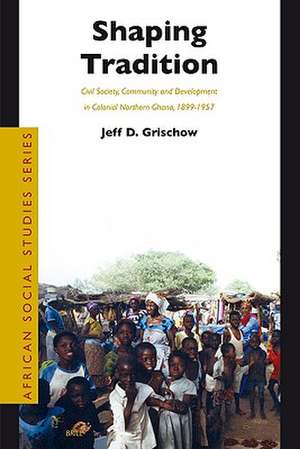Shaping Tradition: Civil Society, Community and Development in Colonial Northern Ghana, 1899-1957: African Social Studies Series, cartea 14
Autor Jeff Grischowen Limba Engleză Paperback – 16 oct 2006
Din seria African Social Studies Series
- 15%
 Preț: 400.26 lei
Preț: 400.26 lei - 15%
 Preț: 421.76 lei
Preț: 421.76 lei - 15%
 Preț: 521.68 lei
Preț: 521.68 lei - 15%
 Preț: 395.90 lei
Preț: 395.90 lei - 18%
 Preț: 558.05 lei
Preț: 558.05 lei - 15%
 Preț: 398.74 lei
Preț: 398.74 lei - 15%
 Preț: 398.33 lei
Preț: 398.33 lei - 15%
 Preț: 398.48 lei
Preț: 398.48 lei - 15%
 Preț: 398.00 lei
Preț: 398.00 lei - 15%
 Preț: 399.69 lei
Preț: 399.69 lei - 15%
 Preț: 400.90 lei
Preț: 400.90 lei - 38%
 Preț: 398.48 lei
Preț: 398.48 lei - 15%
 Preț: 395.83 lei
Preț: 395.83 lei - 15%
 Preț: 402.26 lei
Preț: 402.26 lei - 15%
 Preț: 397.68 lei
Preț: 397.68 lei - 15%
 Preț: 400.09 lei
Preț: 400.09 lei - 15%
 Preț: 395.68 lei
Preț: 395.68 lei - 15%
 Preț: 397.68 lei
Preț: 397.68 lei - 15%
 Preț: 400.50 lei
Preț: 400.50 lei - 15%
 Preț: 396.88 lei
Preț: 396.88 lei - 15%
 Preț: 399.69 lei
Preț: 399.69 lei - 15%
 Preț: 397.36 lei
Preț: 397.36 lei - 15%
 Preț: 402.52 lei
Preț: 402.52 lei - 15%
 Preț: 399.28 lei
Preț: 399.28 lei - 15%
 Preț: 400.50 lei
Preț: 400.50 lei - 15%
 Preț: 393.65 lei
Preț: 393.65 lei - 15%
 Preț: 369.64 lei
Preț: 369.64 lei - 15%
 Preț: 397.68 lei
Preț: 397.68 lei - 15%
 Preț: 369.86 lei
Preț: 369.86 lei - 15%
 Preț: 363.98 lei
Preț: 363.98 lei - 15%
 Preț: 397.36 lei
Preț: 397.36 lei - 15%
 Preț: 368.51 lei
Preț: 368.51 lei - 15%
 Preț: 368.51 lei
Preț: 368.51 lei - 15%
 Preț: 396.06 lei
Preț: 396.06 lei - 15%
 Preț: 414.62 lei
Preț: 414.62 lei - 15%
 Preț: 394.14 lei
Preț: 394.14 lei -
 Preț: 365.91 lei
Preț: 365.91 lei - 15%
 Preț: 394.71 lei
Preț: 394.71 lei - 15%
 Preț: 445.38 lei
Preț: 445.38 lei - 15%
 Preț: 396.38 lei
Preț: 396.38 lei - 15%
 Preț: 403.98 lei
Preț: 403.98 lei - 15%
 Preț: 397.68 lei
Preț: 397.68 lei - 15%
 Preț: 401.39 lei
Preț: 401.39 lei - 15%
 Preț: 397.93 lei
Preț: 397.93 lei
Preț: 397.83 lei
Preț vechi: 468.04 lei
-15% Nou
Puncte Express: 597
Preț estimativ în valută:
76.13€ • 78.97$ • 63.48£
76.13€ • 78.97$ • 63.48£
Carte indisponibilă temporar
Doresc să fiu notificat când acest titlu va fi disponibil:
Se trimite...
Preluare comenzi: 021 569.72.76
Specificații
ISBN-13: 9789004152434
ISBN-10: 9004152431
Pagini: 264
Dimensiuni: 160 x 240 x 18 mm
Greutate: 0.51 kg
Editura: Brill
Colecția Brill
Seria African Social Studies Series
ISBN-10: 9004152431
Pagini: 264
Dimensiuni: 160 x 240 x 18 mm
Greutate: 0.51 kg
Editura: Brill
Colecția Brill
Seria African Social Studies Series
Public țintă
All those interested in intellectual history, rural history, African history and International Development Studies.Notă biografică
Jeff D. Grischow, Ph.D. (1999) in History, Queen's University, Canada, is Asistant Professor at Wilfrid Laurier University, Waterloo, Ontario, Canada. He has published on the history of development and disease in colonial Ghana.
Recenzii
'Grischow studies the work of the West African Lands Committee, the important governorship of Sir F. G. Guggisberg, and the subsequent implementation of indirect rule between 1932 and 1936. Ultimately, working through "chiefs" was found to promote neither economic growth nor social welfare, and after WWII, "local government" as the "preferred administrative framework for development" gradually replaced indirect rule.'
Summing Up: Highly recommended. CHOICE (August 2007)
Summing Up: Highly recommended. CHOICE (August 2007)
